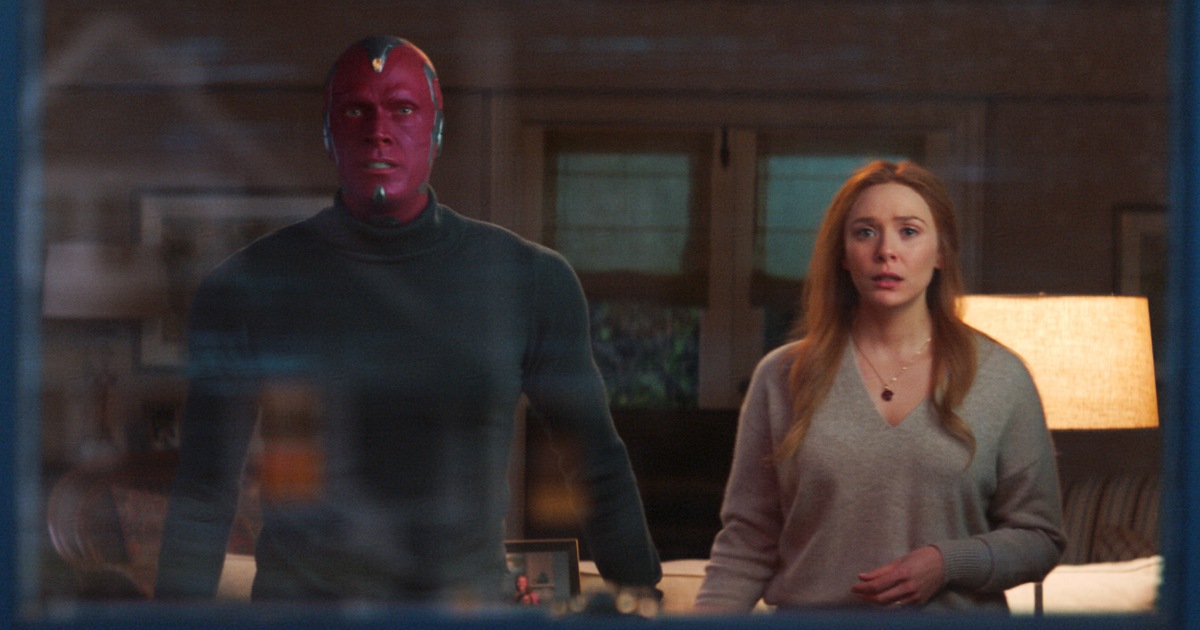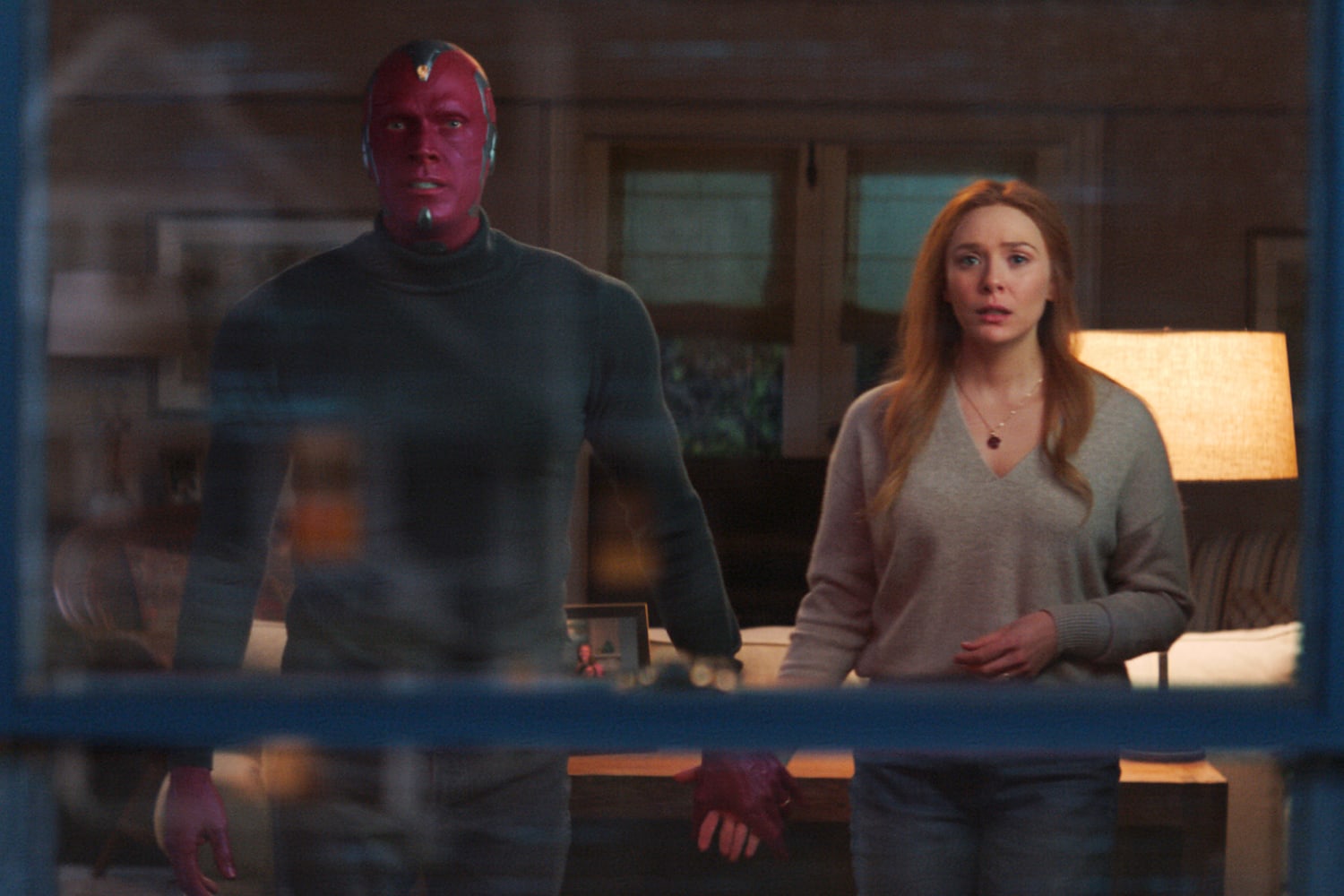
Despite myriad challenges and months’ worth of delays, the Marvel Cinematic Universe (MCU) has somehow debuted on Disney+ with the perfect series. “WandaVision,” which ends its first season Friday, is the story of a grieving Wanda Maximoff (Elizabeth Olsen), who uses her superpowers to reformat a small New Jersey town into the perfect “as seen on TV” little suburb. She and a fantasy version of her boyfriend, Vision (Paul Bettany, who audiences saw die in “Avengers: Infinity War,”) and the children they never had live out a sitcom-style life, complete with nosy neighbor (Kathryn Hahn), opening theme songs and the occasional commercial interruption.
But despite the gags, at its heart this is an intimate portrait of Wanda’s struggle to accept the loss of her first love.
But despite the gags, at its heart this is an intimate portrait of Wanda’s struggle to accept the loss of her first love, a poignant small story within the ecosystem of the MCU’s grander narrative. Loss has been a key Marvel theme — and one that resonates deeply during the pandemic. Marvel’s “Infinity Saga” centers around an incomprehensible planet-wide tragedy — the trauma of losing half the world’s population. In “WandaVision,” we see a literal superhero using TV escapism to avoid processing the emotional fallout of circumstances beyond their control.
This universally understandable theme is made even more timely by our reality (and popular by that reality’s soaring at-home streaming numbers). The show’s nine-week run, presented in an unapologetically episodic manner, also gave the franchise a chance to dive into characters in way the movies don’t, especially blockbusters where multiple superheroes and sidekicks have to share the screen.
Olsen’s Wanda is now Marvel’s most complex heroine. Her character is a disastrous ball of competing backstories in the comics, and her depiction in Marvel films felt mostly like tangents, one more character in an overstuffed tableau. “WandaVision” gave both the actress and the franchise a chance to finally create a true “origin story” for her superhero persona, The Scarlet Witch, with deeply satisfying results. Her work with Bettany also created something Marvel’s earlier works rarely manage — a genuine love story. And while the finale couldn’t resist a flashy, CGI heavy, superhero-greenscreen-battle, the narrative’s emotional core shone through. This was the story of Wanda and Vision, and how the most important part of love is learning to let go.
The episodic format also worked to Marvel’s advantage by creating a sustained level of buzz for two and a half months. Disney+ was already pushing to bring back the old adventure-of-the-week storytelling format with shows like “The Mandalorian.” But “WandaVision” took things a step further. It created a miniature history of the stories we tell ourselves, in the format we told them, from the early housewife-centric “can Wanda pull off a surprise dinner?” to the more “Modern Family”-style “struggle to juggle it all” motif.
And it did this while also building an overarching narrative that tied into current big-screen Marvel storylines. Through “WandaVision,” fans have been introduced to the now-grown Monica Rambeau (Teyonah Parris) from “Captain Marvel.” The series also addressed the meta-narrative of Disney’s takeover of Fox’s “X-Men” series by casting Evan Peters as the same Marvel character he played in the former rival studio’s version of the Marvel-verse.
It’s a lot to do in one show, and there are definitely moments where “WandaVision” didn’t quite manage to strike the balance. But even in episodes like the “Malcolm In the Middle” tribute, where the series dropped the conceit within minutes, or the “Bewitched” parody that had too much pastiche, the show always got what mattered right: It created an engrossing, captivating world that left fans wanting more.
“WandaVision” also proved, despite high-profile failures on Netflix and ABC, that comics work great as TV shows. Comics were created to be weekly adventures that build into serialized storytelling, just like the current trend in prestige TV. And when adapted to follow an old-school TV format, rather than a 13-episode binge, the weekly installments can marry beautifully with comic book storytelling.
The superhero era of the 2010s ran into a buzzsaw with the pandemic, revealing that big-screen spectacles like “Wonder Woman 1984” don’t shine nearly so bright on streaming. But “WandaVision” proves these stories are more versatile than we may have originally believed. And that’s also why they’re so popular. Who would have guessed that a comic book-based tribute to sitcom genres would capture the zeitgeist? Yet, here we are, with the Scarlet Witch’s story the perfect encapsulation of the moment. Thirteen years into the MCU experiment, the franchise is still finding ways to dominate the cultural conversation.
Source: | This article originally belongs to Nbcnews.com










